- Home
- Jim Fergus
The Vengeance of Mothers Page 25
The Vengeance of Mothers Read online
Page 25
“I’m so happy you did,” I said. “And how is your little donkey, Dapple?”
“But you know Dapple?” she asked.
“Yes, I do. A fine little fellow.”
“Why, he is doing splendidly, thank you for asking. Now that you mention it, you do look vaguely familiar to me … perhaps I have seen you about the village?”
“Altogether possible,” I said.
I took my leave then, with Gertie promising that we would have a visit soon in a quieter setting.
As I was leaving the dance, Phemie called me from behind. I stopped, and turned as she approached. “May I have a word with you in private, Molly?” she asked.
“Of course.”
We stepped a bit outside the light cast by the fire. “As you can see, Martha still has a very incomplete recollection of events, and people,” Phemie said in her softly beautiful, melodious manner of speaking. “But gradually, little by little, her memories are returning, though often imperfectly.”
“Maybe that is the best way,” I said.
“I know what you did for her, Molly. Susie and Meggie told me everything. And I know Jules Seminole all too well. You are a courageous woman.”
“No, I am not … really … I was just trying to get away from him.”
“But you took Martha with you, without even knowing who she was. You didn’t have to do that. You could have left her behind.”
“I wouldn’t leave a dog behind with that man if I could prevent it.”
“One day, I hope we will have our chance to avenge Martha,” Phemie said, “and the rest of our friends, for all that Seminole has wrought. It is that which I wish to speak to you about. As you must know, Pretty Nose and I have formed a women’s warrior society. We meet privately, as tribal protocol dictates, and only members or prospective members are allowed to attend. In the short time that you have been here, you may already have heard mention of some of the men’s warrior societies. Each of these has four young women attached to it, who are referred to as nutuh’ke’ â, which means ‘female soldier.’ However, these girls are not actual members of the society, nor do they go to war. Their duties are primarily social—they attend meetings, they take part in the singing and dancing, and they cook for the men. They are usually pretty girls, all from good families, and it is considered an honor for them to be asked to fulfill this role, which they do in much the same way as a nun devotes herself to her vocation.
“I tell you this so that you understand the distinction between our warrior society and those they call female soldiers. You see, we actually train for war, and when it comes, we will fight side by side with the men. Pretty Nose was given permission by the tribal chiefs to form this society because she has proven herself in battle … as, I believe, have I. We both fought against the Army when Mackenzie attacked our village … we counted coup, and we killed soldiers. I was gravely wounded myself and thought to be dead, but my husband, Black Man, came back for me. He took me to the Arapaho village of a chief named Little Raven. The medicine men there cared for me and brought me back to life. When we heard that Little Wolf had escaped from Camp Robinson, we came here to rejoin his band.
“All this I want you to know, because I wish to ask you to join our warrior society. I can see that you are a strong girl, and I know you are brave, even if you deny it. The Kellys tell me that you are also a quite competent horsewoman. All these are qualities I seek in my warriors. And one other … anger.”
“Why anger?”
“Because it hardens the desire for vengeance.” Phemie was wearing a pair of men’s breechclouts, which she now untied and let fall to the ground; naked from the waist down, she turned her back to me, reached behind, and touched a prominent raised scar just above her buttocks, the waxy skin that covered it shining in the moonlight. “Do you know what that is, Molly?” she asked.
“No.”
“It is a brand, the initials of my white slave master, burned into my flesh when I was eight years old, the same year he took me into his bed. I show it to you so that you know I understand the power of anger. It is for the reminder of this brand I have carried for most of my life, and will carry for the rest of it, that I am a warrior.”
“I am so terribly sorry, Phemie,” I said. “Such terror … such horror you must have borne … But you do not even know me. What makes you think that I am angry?”
“Meggie and Susie have told me you lost a child, though they don’t know how. They said you were in prison for murder, though they don’t know who you killed or why. They said you are willful and bullheaded, and don’t take well to authority. That sounds like an angry woman to me.”
I told Phemie that I appreciated her invitation, that no one had ever asked me to join a warrior society before. And I admitted that it sounded like a more interesting occupation than hauling wood and water, and digging tubers. But I also told her that I was not seeking vengeance, and I did not wish to go to war. “We saw soldiers die, Phemie,” I said, “along with members of our own party, during the attack on our train—frightened young men who had never been west of the Mississippi. I will do what I have to do to protect myself and my friends, but I don’t want to kill soldiers.”
“Believe me, Molly,” she said, “if you stay among these people long enough, protecting yourself and your friends will require that you kill them, or be killed.”
I saw with dismay that I had not left the dance soon enough, for out of the corner of my eye I spotted my partner coming toward me, wrapped in his blanket. He was clearly highly nervous, and as he approached, he kept his eyes diverted, even as he stopped in front of me and opened his blanket. He was two heads shorter than I, and if I exaggerate by stating that he looked to be thirteen years old, I do not when I say that he couldn’t have been a day older than sixteen.
“Your future husband stands before you, Molly,” said Phemie with a deep, rich chuckle. “Step inside and you begin your life as this fine young man’s squaw. If it is any consolation, he is from a very good family.”
It was at that moment that another man, leading three horses, came up behind us. He spoke softly to the youngster, who closed his blanket around himself and with downcast head turned away and hurried off. Dog Woman, having witnessed this scene, now bustled over toward us, squawking like an agitated chicken and waving her arms. The man spoke softly again and held the horses’ lead ropes out to her. Immediately calmed by this gesture, she took them in hand and answered in a tone of what sounded like gratitude. Then she turned and spoke something to me, which, of course, I did not understand.
“What is happening here?” I whispered to Phemie.
“Hawk just purchased you from Dog Woman for three horses,” she said.
“And am I commanding a good price?” I asked with a smile.
“A very handsome sum,” said Phemie, laughing, “which has clearly changed the old charlatan’s mind about the most suitable match for you. She just gave you her official benediction to marry Hawk.”
Hawk now spoke a greeting of some sort to Phemie in Cheyenne, and she answered him in kind. “Hawk is a fine man,” she said to me. “He and I fought together at one point during the Mackenzie attack. Good luck, Molly, think about my offer. All I ask is that you come to one of our meetings.”
She turned and left us, and I stood alone then with Hawk in the shadows of the moon, feeling oddly shy and speechless. The dance continued in the circle, the flutes, the rattles, the drums in their hypnotic, pulsing beat, the fire still burning bright, the moon high now in the sky, lighting the prancing dancers like a beacon. All of our girls had returned to the dance. From this little distance, I could tell them apart only from the grace of their steps … or lack thereof—Lulu with her professional élan; Maria, sprightly as a nymph of the woods; Carolyn, surprisingly graceful for one who had only just begun dancing; Astrid with a step as fluid as the sea of her homeland, and coupled with, of all people, our good chaplain, whose religion he had told us prohibited this recreation. “With the except
ion of square dancing,” he had explained, “which is permitted, as there is no physical coupling of partners, a contact which risks inappropriately inflaming the passions.” Yet here was Christian dancing with wild abandon that had all the appearance of passion inflamed. Then there was Lady Hall, dancing with Bridge Girl … two more enthusiastic left feet I have never before witnessed; and Hannah, so often timid in demeanor, as lively afoot as a Liverpudlian elf.
Having tried to calm my racing heart by watching my friends for this long moment, I turned finally to Hawk, and all I could think to say was: “Thank you.”
He led me in silence back to his lodge. An old woman sat inside tending a small fire in the center. She rose as we entered, spoke a word to Hawk, and left through the opening without looking at me. Hawk indicated that I was to sit down. He took a tin trade pan of warm water from beside the fire, and dipping a cloth into it, he began to clean the greasepaint from my face.
“Are you ever going to speak to me again?” I asked. “After all, if we’re getting married, it would be nice to have a little conversation between us.”
“Yes, after you learn Cheyenne,” he answered with a wry smile.
“That’s not fair. I am trying to learn it. You should be willing to speak your maternal language. Remember, as the son of a white woman, you, too, are considered white by your tribe’s own beliefs.”
“I am not white, nor does your tribe accept me as one of their people.”
“That is true.”
“I wish for you to lie with me at my sleeping place,” he said when he had finished cleaning my face. “I wish only to talk to you. This is why I speak your language now.”
“That sounds like a splendid idea,” I said, and I laughed. “I am too nervous to do anything but talk.”
“As am I.”
We lay down beside each other at his sleeping place, fully clothed beneath the buffalo robes. “Who was that old woman?” I asked.
“My grandmother,” he answered, “the mother of my Lakota father.”
“Why did your mother speak English to you when you returned from the Indian school, if she did not wish for you to learn the language?”
“We only spoke English in private,” he said, “never when others were around. She wanted me to be Cheyenne. When I came back from Indian school, I had more English than she. Even though she did not wish to return to the white world, she wanted to keep some contact with her past, which she did by speaking her first language with me. That was a private place we shared.”
“As you and I must share it,” I said. “Until I learn your language we have no other means of communication.”
“You know more about my life than you have told me about yours,” Hawk said. “You know what happened to my mother, my wife, and my child. Now tell me your story. Tell me about your daughter.”
“That is something I am not yet able to speak of … not to you … not to anyone.”
“Then we have nothing further to say to each other.”
“I’m sorry. I cannot.”
We lay beside each other in silence for a long time, our clothed bodies touching lightly. When Hawk’s breath came deep and even with sleep, I began to tell my story in a whisper:
I grew up on a farm in upstate New York. I was an only child. My father enlisted in the Union Army at the outbreak of the War between the States, and he was killed at the Battle of Appomattox in April of 1865, three days before the surrender of the Confederate Army. My mother and I had kept the farm going as well as we were able to, with the help of a neighboring farmer’s son. After my father’s death, I also taught school in the one-room schoolhouse after the former mistress, Miss Nichols, died suddenly of heart failure; I had always been a good student and I loved to read, and though I was only fourteen years old, there was no one else in the community to fill her position.
I married the neighbor’s son, who was six years older than I. I was already tall and physically mature for my age, and to marry young and start a family was not so uncommon in farm country. I gave birth to a baby girl … Clara, I named her.
My mother hoped we would stay on the farm, but my husband detested farming. He was a dreamer, one of those men never content with his lot in life, always blaming others for his troubles—he blamed his parents, my father, my mother, me, he blamed even our baby daughter, Clara, for standing in the way of his dreams. He dreamed of moving to the city to be involved in the burgeoning financial world there, which he eagerly read about in the newspapers. He imagined himself becoming a banker, sitting in an office behind a mahogany desk, wearing custom-made suits and patent leather shoes, not, as he put it, “spending the rest of my life scraping cow dung off my boots.”
When our daughter was three years old, we finally decided to move to the city. There was no question that my mother would be able to run the farm alone, and so we sold it, and she purchased a small cottage in town. We went to New York City. It was the worst decision of my life, one I have regretted every single day since.
I hated the city from the beginning, the filth, the close quarters, the hordes of people. I missed the farm terribly, and right away things began to go badly for us, as I had feared they would. My husband … I will never speak the man’s name again … my husband seemed to believe that he would somehow be welcomed into New York’s financial world, that doors there would open magically for him, although he was just a country boy himself, and all he knew about it was what he had read in the newspapers.
The only job he was able to find in a bank, finally, was as part of the crew that cleaned it after business hours. He learned very quickly that this was not a position that would lead to custom suits and patent leather shoes. He told me that while they were cleaning, he sometimes liked to sit for a moment behind the bank president’s desk, which was the closest he would ever come to realizing his dreams. By then of course I knew all too well that my husband was a weak man, but in our society girls are taught to stay with our men, no matter what; we are not given any other choice.
I managed to find work teaching at a school in the Five Points neighborhood. This was my first exposure to the slums, a terrifying place of shocking poverty, human suffering, debauchery, and crime. It was there that I met the people who ran the Children’s Aid Society, and I took a second job working for them. My duties included placing children without homes in one of the many orphan asylums with which the organization worked, or in one of the lodging houses they themselves operated throughout the city. There were so many children living on the streets, especially in Five Points, many of them belonging to immigrant families who found themselves unable to care for all their offspring. Some we sent on orphan trains to live with farm families in the Midwest, and I helped organize one group that was sent upstate to the country where I had grown up. How I longed to go back there with them. And I should have. I should have taken Clara and gone home. For not having done so, I will never forgive myself …
My husband had started drinking, and our marriage further deteriorated. He began to miss work, and to spend his time and our money in disreputable taverns among the most lowlife of companions—bums, drunks, drug addicts, and petty criminals. Of course, he blamed me for all his failures. If he had only come here earlier, he said, when he was younger, he could have made a start in the business. If I had not “tricked” him into marrying me, by burdening him with a child, he could have had a grand success. But no, because of me he was stuck for those years on the farm, his best years when he would have had a chance to get ahead, to make something of himself, but now it was too late for him. Virtually every day, I heard some variation of this litany of his woes.
We had already moved three times since we had been in New York, each time to less expensive lodgings. We were not yet living in a tenement building, but we were not far from it. We had rented a tiny, shabby row house on the Lower East Side, just on the edge of Five Points itself. It seemed clear that we were locked in a deadly downward spiral from which there was no escape. Although I had taken o
n more work to try to make ends meet, teaching school and part-time employment with a charitable foundation are hardly high-paying positions. My days were increasingly long, the hours often irregular, and I was always exhausted. I was entirely supporting the family now, my husband barely working at all, except for rare odd jobs, the proceeds of which he immediately drank or gambled away. When he wasn’t in the taverns trying to cadge free drinks or passed out in an alley somewhere, he stayed home drinking whatever cheap alcohol he managed to acquire on the street. Sometimes he went out and did not come home for several days. I never asked him where he had been, I did not wish to know, and I began to pray that one day he would not return.
He became increasingly violent when he drank, breaking dishes, chairs, and tables in his drunken rages. It was only a matter of time before he began to strike me, accusing me again of ruining his life, the same old cowardly recitation of self-pity and blame. I was taller than he, and strong enough that I could usually defend myself against his assaults, and by then he was usually so drunk he would fall down and pass out before he could hurt me too severely.
Clara was six years old now, and despite all our family troubles, a beautiful, cheerful, trusting little girl. When she wasn’t in school, I often had to leave her with neighbors when I was working, for I could no longer trust her father to look after her. I had to pay them for watching her, which was yet another drain on our already desperate finances.
One evening while we were eating dinner, Clara mentioned that her friend Cristina, who lived next door and whose family were immigrants from Romania, had received a bicycle from her parents for her birthday. Clara said she wished she could have a bicycle, too. I will never forget how her father looked at her in that moment, with an expression of such loathing, as if this simple wish of a little girl to have a bicycle was meant as a personal reproach to him for his failures. Then he leaned over and slapped her across the face. He had never hit Clara before, and she was so shocked, so hurt that it took a moment for the tears to well up in her eyes. Finally, she broke down and began bawling. I took her to her room and tried to console her. “Daddy didn’t mean to hurt you,” I said. “He’s just having a hard time at work, that’s all. Of course you can have a bicycle, darling. We will go look for one soon, I promise.”

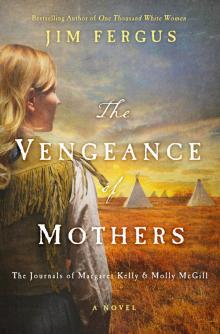 La Vengeance des mères
La Vengeance des mères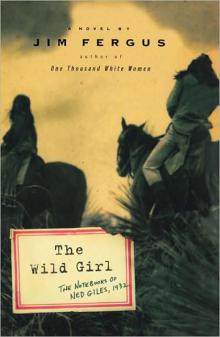 The Wild Girl: The Notebooks of Ned Giles, 1932
The Wild Girl: The Notebooks of Ned Giles, 1932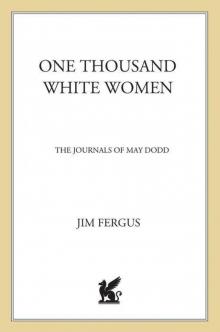 One Thousand White Women
One Thousand White Women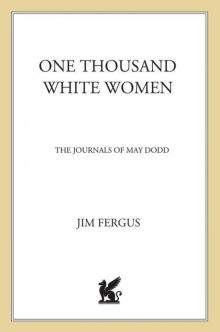 One Thousand White Women: The Journals of May Dodd
One Thousand White Women: The Journals of May Dodd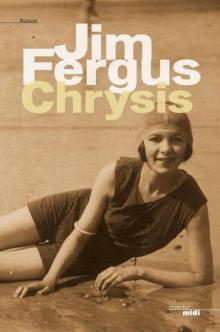 Chrysis
Chrysis Strongheart: The Lost Journals of May Dodd and Molly McGill
Strongheart: The Lost Journals of May Dodd and Molly McGill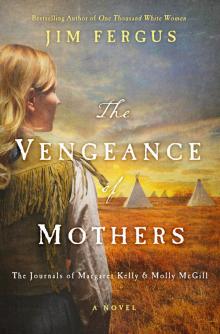 The Vengeance of Mothers
The Vengeance of Mothers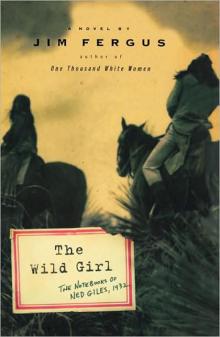 The Wild Girl
The Wild Girl